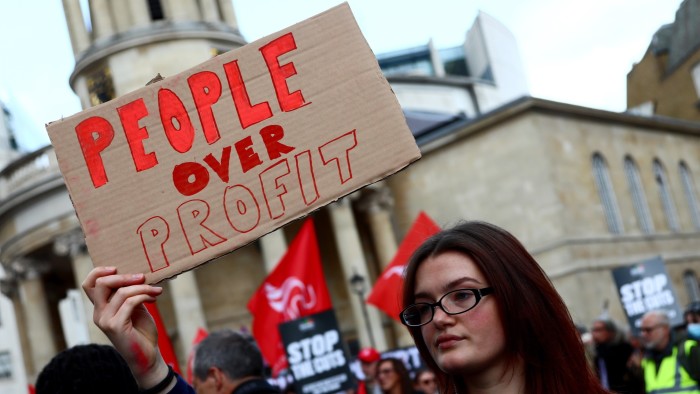This article is an on-site version of our Inside Politics newsletter. Subscribers can sign up here to get the newsletter delivered every weekday. If you’re not a subscriber, you can still receive the newsletter free for 30 days
Good morning. The rebellion against Labour’s planned welfare cuts continues to grow. How much trouble is the government in? Quite a bit, I’d say. Some thoughts on that below.
Inside Politics is edited by Georgina Quach. Follow Stephen on Bluesky and X, and Georgina on Bluesky. Read the previous edition of the newsletter here. Please send gossip, thoughts and feedback to insidepolitics@ft.com
Death by a thousand cuts
One hundred and eight Labour MPs have signed their names to a reasoned amendment tabled by Meg Hillier, the Treasury select committee chair, that would decline to pass the government’s planned cuts to welfare. The significance is both mathematical — more than 83 MPs would have to rebel to defeat the government — and political, in that the list of signatories includes members of every one of Labour’s traditions and factions.
Both give the revolt greater momentum and impetus: voting against it no longer represents a) a fruitless gesture or b) only alignment with “hardcore Starmer critics and serial troublemakers”, as one Labour MP put it to me about an earlier rebellion. The latter concerns some ambitious MPs.
Ahead of next week’s vote — the first major legislative clash on the measure — the government still has a number of cards it can play, not least the damage to its prestige if it loses the vote, and the looming prospect of a reshuffle in the autumn.
But the big problem for the government remains: while Labour MPs support most of its planned welfare reforms (the changed pathway back to work for claimants out of employment, the new approach to younger people, and so on), most don’t think there is any justification for the changes to personal independence payments (Pip) beyond “these are the changes we could persuade the Office for Budget Responsibility to score positively against the forecast”.
Indeed, that view is shared by the country, according to the latest polling by More in Common. Most voters want the government to reverse its planned Pip cuts which they believe are primarily a money-saving measure, the poll suggests.

As I have said before, one reason for all that is: it’s true! The government is right to be worried that the UK now spends as much on benefits (excluding pensions) as it did during the financial crisis, while being less effective at reducing destitution than it was then. But most of the government’s spending cuts do nothing to solve this problem — they just make some fairly arbitrary and cruel changes to eligibility for some disabled people.
Under the proposals, claimants need to score four or more points for at least one of the “daily living” activities to qualify for that component of Pip. The new requirement is designed to target Pip for “those with higher needs”, but that may exclude those who currently qualify by accumulating lower scores across multiple activities. For instance, an individual needing assistance to wash their hair or body below the waist (2 points), dress their lower body (2 points), prepare a simple meal (2 points), and manage toilet needs (2 points) would not meet the new single-activity threshold, despite a total score of eight points.
It’s not obvious why someone who needs assistance to get out of the bath or shower will be able to claim less if they can wash themselves below the waist but not above. When faced with the detail of the government’s proposals, most people recoil from them.

Whatever happens next week, it’s a reminder of an old truth: that in the end, politics catches up with policy. Even if — and this is an increasingly big “if” — the government sees off the rebellion, a change of approach is going to be required sooner or later.
Now try this
This week, I mostly listened to Haim’s new album I quit while writing my column. I agree with Ludovic Hunter-Tilney on his review: it’s not very good.
Top stories today
-
‘What they have experienced is devastating’ | A national investigation has been launched into NHS maternity care in England following a series of damning reports. It will begin this summer and conclude by December 2025.
-
Sounds familiar | The long-awaited industrial strategy attempts to tackle obstacles facing eight strategic sectors as companies try to scale up. But some of the initiatives highlighted are not new. Our reporters unpack the 160-page document here.
-
Spanish exit | Keir Starmer will pledge to Nato that the UK will raise spending on national security to 5 per cent of GDP within a decade, as members attempt to convince US President Donald Trump to stick with the alliance (this new promise would increase core defence spending to 3.5 per cent of GDP by 2035). While almost all Nato members have agreed to the spending level pushed by Nato secretary-general Mark Rutte, Spain opted out on Sunday, in a blow to the cohesiveness of the group.




